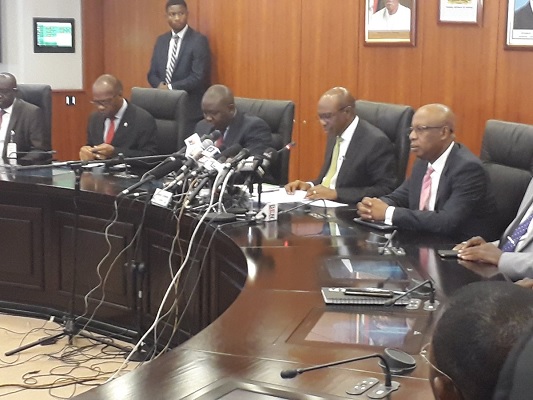MPC: Experts express concern over hike in cash ratio to 27.5%

…Say Banks may have little to lend to key sectors
…Mopping up liquidity behind MPC decision-Emiefele
Experts have raised concern over the decision of the Monetary Policy Committee (MPC) of the Central Bank of Nigeria (CBN) to raise Cash Reserve Ratio (CRR) from 22.5 per cent to 27.5 per cent.
The MPC, on Friday, maintained all economic parameters unchanged, except the CRR that was raised by 500 basis point to 27.5 per cent.

The CRR is the quantum of cash or total deposit of customers which commercial banks hold as reserves either in cash or as deposits with the central bank for lending to customers.
Commenting on this development, experts believed that raising the cash reserve ratio will leave banks with little credit to lend to real sectors of the economy.
An economist and the Chief Executive Officer of BIC Consulting Services, Dr. Boniface Chizea, cautioned the MPC on the implications of the decision.
“We all know that inflation is on the rise and it was caused chiefly by the ongoing border closure directive; as a result, food inflation is surging.
“Although we don’t have the necessary data at our disposal, we are rather surprised that instead of the committee to address the inflation situation, they delved completely to cash reserve which I think is not necessary to raise for now,” he said.
Chizea, however, stated that if liquidity is the reason behind the MPC decision, it will be proper to consider its implications, one of which is a situation where banks will be left with little to lend.
“The truth is too much money in circulation will definitely cause inflation and I understand the point CBN is making. But we have to take cognizance of the fact that there is an existing directive to banks to have 65 per cent of Loan to Deposit Ratio (LDR) being given out as loans to customers, so when you add that and the CRR directive now, you will realise that banks will be left with about eight per cent of aggregate cash.
“They will have to use the rest for foreign exchange and other operations which I feel will leave them with little to lend,” he added.
He advised the apex bank to thread with caution so they won’t cause another problem while trying the solve one.
In the same vein, an economist, Mustapha Babale, has cautioned the Central Bank not to add to the current hardship of Nigerians with the current CRR directive.
He said the directive has some implications especially to the private sector.
He said with this decision, aggregate money available to banks for lending will reduce as the banks will be required to retire more funds at the CBN.
“The implication this directive may have will be on interest rates, as such since banks don’t have much to lend, they may also increase interest rates for loans so they could make some gains.
“Directly or indirectly, it’s the common man on the street that will suffer at the end because when interest rates are increased on loans, it will surely have impacts on everything,” he added.
Read Also: Subsidy payment of N45.21 on each litre of petrol not sustainable – PENGASSAN
The CBN governor said the CRR was raised to help curb monetary induced inflation while retaining the benefit of the bank’s non-ratio deposit which has significantly increased credit to the private sector.
He added that raising cash ratio was necessary to “curtail liquidity sulphate in the banking system.”
Meanwhile, the MPC held all other monetary rates constant as it retained the MPR at 13.5 per cent; asymmetric corridor at +200/-500 basis points around the MPR; as well as the liquidity ratio at 30 per cent.








